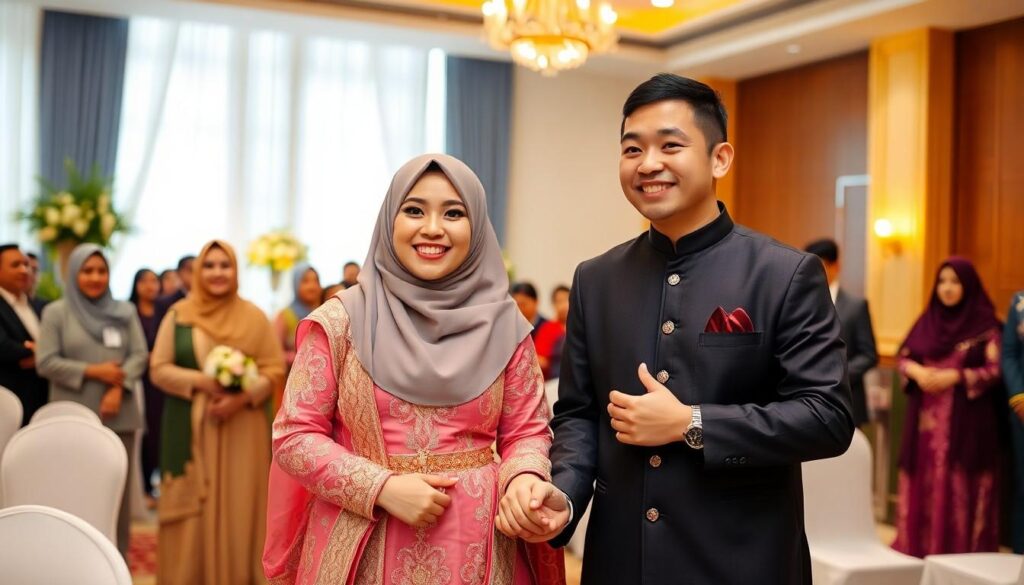Marriage in Islam isn’t just a contract; it’s a sacred bond that comes wrapped in love, respect, and a sprinkle of divine guidance. Picture this: two people embarking on a journey together, armed with shared values and a commitment to support each other through thick and thin. It’s like being on a rollercoaster—thrilling, sometimes a bit scary, but ultimately rewarding when you hold on tight.
But hold your horses! Before diving into the world of Islamic marriage, it’s essential to understand its unique principles and cultural nuances. From the significance of mutual consent to the beauty of a well-planned Nikah ceremony, there’s a lot more than meets the eye. So, buckle up as we explore the intricacies of Islamic marriage, where tradition meets modernity in a delightful dance of love and partnership.
Table of Contents
ToggleUnderstanding Islam Marriage
Islamic marriage represents a sacred partnership marked by mutual respect, love, and spiritual guidance. Such unions thrive on shared values and the principles outlined in Islamic tradition.
Definition and Importance
Islamic marriage, known as Nikah, is a formal agreement between two individuals. This contract establishes the foundation for a lifelong partnership based on companionship and support. Nikah holds great significance within the Muslim community, as it fulfills religious obligations while promoting family values. The act of marrying is viewed as a means to enhance religious piety and societal stability. With the assertion that marriage is half of faith, individuals see this bond as essential for spiritual growth and harmony within the community.
Key Principles
Mutual consent stands at the core of Islamic marriage, ensuring that both partners willingly agree to the union. This concept empowers individuals to make informed choices about their life partners. Transparency is vital; couples are encouraged to openly discuss major life issues before marriage. Financial responsibilities also play a crucial role within the partnership, as the husband is generally expected to provide for the family while the wife may contribute as well. Lastly, kindness and compassion are paramount, as both partners should strive to nurture and respect each other throughout their lives.
Types of Islam Marriage

Islamic marriage encompasses various forms, each holding cultural and religious significance. Understanding these types provides insight into the diverse practices within Muslim communities.
Nikah and Its Significance
Nikah represents the formal Islamic marriage contract. It establishes a legal and spiritual bond between spouses. This contract signifies mutual consent and commitment, essential for a successful partnership. At the Nikah ceremony, the bride and groom express their agreement publicly, reinforcing their intentions. Additionally, the presence of witnesses emphasizes the importance of community in the marriage process. This ceremony holds great significance, as it aligns the union with Islamic values, promoting love, respect, and shared responsibilities.
Other Forms of Marriage in Islam
Besides Nikah, other forms of marriage exist in Islam, accommodating various cultural practices. Polygamy allows a man to marry up to four wives, provided he treats each fairly and equally. The practice necessitates clear communication and consent from all parties involved. Temporary marriage, known as Mut’ah, exists in some Islamic traditions, allowing short-term contracts under specific circumstances. While less common, it signifies flexibility within marriage norms. Understanding these forms showcases the adaptability of Islamic marital practices, reflecting cultural influences while adhering to religious principles.
Cultural Practices Around Islam Marriage
Cultural practices surrounding Islamic marriage vary widely, reflecting the diversity of Muslim communities across the globe. Traditions often intertwine with local customs, creating unique marriage experiences.
Regional Variations
Regional variations significantly shape the practice of Islamic marriage. In South Asia, weddings often last several days, featuring elaborate rituals and vibrant celebrations, while in the Middle East, ceremonies may focus more on formalizing the contract and incorporating family gatherings. African Muslim communities frequently blend Islamic practices with indigenous customs, highlighting community and collective involvement. Each region adapts customs to align with social norms, demonstrating the flexibility of Islamic marriage traditions.
Traditional Ceremonies
Traditional ceremonies play a vital role in Islamic marriage. The Nikah ceremony, a key element, involves an officiant and witnesses, focusing on the couple’s mutual consent and the recitation of vows. In many cultures, pre-wedding events such as the henna night or engagement party occur to celebrate the union. Various regional customs may include specific prayers or rituals that acknowledge the families’ roles in the partnership. All these elements combine to create a rich tapestry of love, commitment, and community involvement, showcasing the importance of tradition in modern marriages.
Rights and Responsibilities in Islam Marriage
Islamic marriage involves specific rights and responsibilities that both partners must uphold to maintain harmony and balance in their relationship. The framework emphasizes mutual respect, kindness, and commitment.
Obligations of the Husband
A husband in Islam has several key obligations toward his wife. He must provide financial support, ensuring the family’s needs are met. Leadership in the household also falls under his responsibilities, guiding decisions while valuing his wife’s input. Ensuring the emotional well-being of his wife is crucial, which includes affection and care. He should also be respectful, treating her as an equal partner. Furthermore, providing a safe and nurturing environment is essential for family growth and unity.
Obligations of the Wife
A wife in Islam carries significant responsibilities toward her husband. She is expected to manage the household, creating a welcoming and organized home. Supporting her husband in personal and professional matters strengthens their bond. Her role encompasses nurturing the children, ensuring their upbringing aligns with Islamic values. Demonstrating respect and kindness further cements their partnership. Lastly, maintaining open communication about concerns establishes trust and understanding within the marriage.
Challenges in Islam Marriage
Islam marriages face various challenges that may impact the couple’s relationship. These challenges often arise from societal expectations and modern influences.
Societal Expectations
Cultural norms shape the expectations individuals have in an Islamic marriage. Families often impose specific roles and behaviors based on regional traditions. Couples may feel pressured to conform to these standards, affecting their personal choices. Issues such as marriage age, choice of partner, and financial contributions frequently emerge in discussions. Partners might experience conflict when their desires differ from societal norms. Open dialogue about these expectations can ease tensions and encourage understanding between spouses. Acknowledging these pressures fosters resilience and growth within the marriage.
Modern Influences
Modern society introduces various factors that challenge traditional Islamic marriages. Exposure to social media and popular culture can result in conflicting values regarding relationships. Individuals may prioritize personal happiness over established norms, leading to tensions. Economic factors also play a significant role, as couples navigate financial independence alongside traditional responsibilities. Moreover, increased mobility and education rates change expectations about marriage roles. Couples often face the challenge of balancing modern views with their religious beliefs. Engaging in discussions about these influences can help redefine the couple’s shared vision for their life together.
Islamic marriage is a profound commitment that blends spirituality with practical partnership. The journey of marriage within this framework is shaped by mutual respect and shared values, allowing couples to navigate life’s challenges together. Understanding the cultural nuances and rights of each partner fosters a harmonious relationship.
As modern influences continue to impact traditional practices, open communication remains vital for couples to align their expectations and aspirations. By embracing both the rich heritage of Islamic marriage and the realities of contemporary life, partners can cultivate a fulfilling and resilient bond. Ultimately, the essence of Islamic marriage lies in the balance of love, responsibility, and community support, paving the way for lasting happiness.








